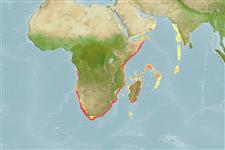Elasmobranquios (tiburones y rayas) (sharks and rays) >
Rajiformes (Skates and rays) >
Rajidae (Skates)
Etymology: Dipturus: Greek, di = two + Greek, pteryx = fin (Ref. 45335).
Environment: milieu / climate zone / depth range / distribution range
Ecología
marino batidemersal; rango de profundidad 88 - 740 m (Ref. 11284), usually 400 - 500 m (Ref. 5578). Deep-water; 21°N - 37°S, 11°E - 77°E (Ref. 114953)
Distribución
Países | Áreas FAO | Ecosistemas | Ocurrencias, apariciones | Point map | Introducciones | Faunafri
Southeast Atlantic and Western Indian Ocean: in scattered localities from Lüderitz, Namibia round the Cape (South Africa) to central Mozambique; also off Madagascar and Kenya; also found off India and Oman (Ref. 114953).
Tamaño / Peso / Age
Maturity: Lm ? range ? - ? cm
Max length : 192 cm TL macho / no sexado; (Ref. 114953)
Short description
Claves de identificación | Morfología | Morfometría
An all-dark longnose skate with its underside uniformly roughened by small denticles; snout acutely pointed and greatly elongated, and tail moderately stout and not conspicuously swollen; pectoral disc angular and broader than in other longnose skates in the area; no nape thorn (Ref. 5578). Dark grey to blackish above and below, ventral mucous pores black (Ref. 5578).
Inhabits the outer shelf and upper slope (Ref. 5578). Rarely caught, probably inhabits hard bottoms that are seldom trawled (Ref. 114953). Feeds on bony fish, crabs and squid (Ref. 5578, Ref. 114953). Oviparous (Ref. 50449). Eggs have horn-like projections on the shell (Ref. 205). Males reaches maturity at 125-135 cm TL, females at 170-190 cm TL. Smallest known specimen at 27 cm TL (Ref. 114953) Probably caught by hake trawlers (Ref. 5578).
Life cycle and mating behavior
Maturities | Reproducción | Spawnings | Egg(s) | Fecundities | Larva
Oviparous, paired eggs are laid. Embryos feed solely on yolk (Ref. 50449). Eggs have horn-like projections on the shell (Ref. 205).
McEachran, J.D. and K.A. Dunn, 1998. Phylogenetic analysis of skates, a morphologically conservative clade of elasmobranchs (Chondrichthyes: Rajidae). Copeia 1998(2):271-290. (Ref. 27314)
IUCN Red List Status (Ref. 130435)
Threat to humans
Harmless
Human uses
Pesquerías: sin interés
Herramientas
Special reports
Download XML
Fuentes de Internet
Estimates based on models
Preferred temperature (Ref.
123201): 6.4 - 12.5, mean 10.4 °C (based on 32 cells).
Phylogenetic diversity index (Ref.
82804): PD
50 = 0.5000 [Uniqueness, from 0.5 = low to 2.0 = high].
Bayesian length-weight: a=0.00275 (0.00175 - 0.00433), b=3.20 (3.07 - 3.33), in cm total length, based on LWR estimates for this species & Genus-body shape (Ref.
93245).
Nivel trófico (Ref.
69278): 4.3 ±0.69 se; based on food items.
Resiliencia (Ref.
120179): Bajo, población duplicada en un tiempo mínimo de 4.5-14 años (Fec assumed to be <100).
Fishing Vulnerability (Ref.
59153): Very high vulnerability (90 of 100).
